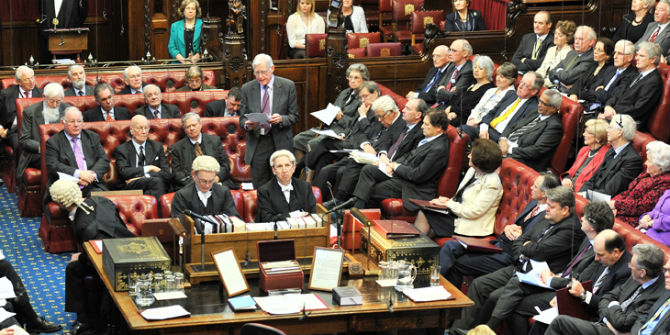 The recent string of government defeats in the House of Lords over amendments to the European Union (Withdrawal) Bill has reignited the debate over the role of the Lords in a modern democracy. The Daily Mail published a characteristically trenchant headline suggesting that we should “pull the plug” on the “traitors in ermine”. With 12 new peers just announced – nine of whom are Conservative – Francis Young considers the legal aspects of ‘packing’ the Lords with pro-Brexit members.
The recent string of government defeats in the House of Lords over amendments to the European Union (Withdrawal) Bill has reignited the debate over the role of the Lords in a modern democracy. The Daily Mail published a characteristically trenchant headline suggesting that we should “pull the plug” on the “traitors in ermine”. With 12 new peers just announced – nine of whom are Conservative – Francis Young considers the legal aspects of ‘packing’ the Lords with pro-Brexit members.
The abolition of the House of Lords is still probably some way off, but the recent events have raised the question of what options a government has to deal with resistance by the Lords to its policies. The normal means of addressing this problem (if one sees it as a problem) is to invoke the Parliament Acts, which provide that the Commons can override the Lords by passing the same bill in two consecutive parliamentary sessions. But this remedy is not readily available in the context of the EU (Withdrawal) Bill, as the current parliamentary session will not terminate until after Brexit day has passed.

The government has recently announced the creation of nine new Conservative peers (along with one DUP and three Labour nominees). This may provide some short-term assistance to Theresa May. Another, more radical option that has been canvassed is that of swamping the House with several hundred new pro-Brexit peers. It is by no means impossible that such a possibility might end up being pursued, by the current administration or a future one, if legislative deadlock over Brexit persists and deepens. Such a course of action might, alternatively, be contemplated by a future Labour administration if, as with Clement Attlee, the Lords did not find Jeremy Corbyn’s programme congenial.
What are the legal aspects of “packing” the Lords with friendly peers?
Historical background
It has been believed for centuries that the Lords can be packed by the executive in order to overcome resistance on a policy issue. Three examples illustrate this.
In 1712, Queen Anne created twelve new peers to facilitate the passage of the Treaty of Utrecht, after the Harley ministry lost a division on the address of thanks over the issue. This was unprecedented, and it shocked contemporary opinion: was the House of Lords to be the creature of the court? One of the men who was originally nominated for ennoblement, Sir Miles Wharton, was so scandalised that he refused to accept his peerage. Queen Anne got her treaty through, but bad memories of the affair lingered on. Just a few years later, in 1718–19, Whig politicians led an attempt to enact a bill which would have placed severe restrictions on the Crown’s ability to create new peers.
Second, the threat of packing was necessary for the passage of the 1832 Reform Act. On the third attempt at parliamentary reform, Lord Grey’s cabinet asked William IV to create 12 or more peers in order to secure a second reading for the legislation; and the request was accepted. In fact, the Lords passed the bill on second reading, but they subsequently attempted to insert a wrecking amendment in committee. Grey went back to the King, who was reluctant to co-operate; haggling ensued over the number of new peers that would be needed. The Government resigned, and the King attempted to form a new administration headed by the Duke of Wellington – a move that brought Britain about as close to revolution as it has ever been. Only then did the King give way and agree to create as many peers as necessary.
Finally, there is perhaps the best known example of a packing threat: the one that was deployed during the stand-off between the Lords and the Commons which resulted in the passage of the Parliament Act 1911. After the Liberals lost their Commons majority in the January 1910 general election, the Prime Minister, Herbert Asquith, advised the King that it might be necessary to create 500 peers in order to overcome the inbuilt Unionist majority in the Lords. George V did not refuse the request, but he did insist on a new election, which duly took place in December 1910. In the event, of course, it did not prove necessary to carry out the threat.
These examples establish two key points. First, packing the House of Lords is a real possibility for a government whose programme is being frustrated by the upper chamber. Second, it is a highly controversial enterprise. Parliament – and the media and public opinion – would apply some degree of restraint to the executive’s freedom of action in this connection. Modern conceptions of the role of the courts in a society governed by the rule of law would also seem to open up the possibility of a legal challenge, just as happened in the Miller case in relation to the use of prerogative powers to trigger Article 50. The creation of peers is a prerogative power which belongs, if not to the same species, at least to the same genus as the (supposed) power at stake in Miller.
Has the prerogative been abridged?
One of the few legal commentators to have spoken publicly about this issue to date is George Peretz QC. Peretz notes that the Parliament Acts amount to a statutory scheme for forcing legislation onto the statute book against the will of the Lords. He suggests that this statutory scheme has abridged the royal prerogative of creating peers for that purpose (the principle that the prerogative can be abridged by statute in this way was affirmed in the leading case of Attorney-General v De Keyser’s Royal Hotel Limited [1920] AC 508). This argument is attractive and economical, as well as being consistent with the plain fact that the possibility of packing the Lords has not seriously been contemplated since the passage of the Parliament Act 1911.
The weakness in the argument is that it presupposes that the mass creation of new peers would have the sole purpose of facilitating the passage of the EU (Withdrawal) Bill. The government might easily make the argument that such a course of action would also have the broader purpose of altering the long-term composition of the Lords – a purpose that has no necessary connection with the Parliament Acts and therefore cannot have been displaced by them. The Lords consists predominantly of pro-EU members; but most voters are in favour of Brexit (or at least were so in June 2016). The government might seek to argue that it is right in principle for the composition of the upper house to be changed in order to align it with the “will of the people”. A future Corbyn administration might put forward an equivalent argument. It would be a brave judge who issued a quashing order under such circumstances.
It is also worth noting that, if the packing power has indeed been displaced by statute, the Lords themselves do not seem to have noticed it. Only last year, Lord Strathclyde, one of the House’s longest serving members, spoke with approval of the power:
It may happen only rarely, but to remove the ability of the Prime Minister to threaten to increase the number of Peers, could lead to an even more assertive House than we have today.
Whatever one thinks of his lordship’s views on this point, it would be surprising if he had failed to realise that the prerogative no longer existed.
Can uses of the prerogative be judicially reviewed?
In the leading case on judicial review of the royal prerogative, Lord Roskill said that “the grant of honours” still stood beyond the intervention of the court (CCSU v Minister for the Civil Service [1985] AC 374, 418). But this is unlikely to present much of an obstacle to a challenge to a Government attempt to pack the Lords. First, as an obiter statement (i.e. one not essential to the court’s decision), it has at its highest only persuasive rather than binding force. Second, any challenge would inevitably reach the Supreme Court, where the persuasive force of the statement would be limited.
It seems unlikely, moreover, that the Supreme Court would dismiss such a challenge on bare jurisdictional grounds, without enquiring into its merits. The judicial trend has been in precisely the opposite direction. Indeed, Mr Justice Maurice Kay recognised as long ago as 2002 that “the ambit of the “forbidden areas” is not immutable and… the areas identified by Lord Roskill… have been reduced.” (R (CND) v Prime Minister [2002] EWHC 2777 (Admin), [50])
Grounds of challenge
Assuming that a legal challenge to packing the Lords would overcome the initial jurisdictional hurdle, what substantive grounds could be raised by the claimant?
The existence of clear historical examples of threats to pack the Lords in order to overcome policy disagreements would seem to weigh against the possibility that such a course of action would be susceptible to challenge on traditional common-law grounds. Government decisions can generally be challenged on the grounds that they are irrational, or that the Government arrived at them on the basis of considering irrelevant factors. But there can surely be no irrationality or irrelevancy in a decision to do something which has been threatened, and accepted to be lawful, on several well-documented occasions in the past (two of which occasions, let us remember, concerned important and salutary constitutional reforms).
Nevertheless, the Supreme Court’s judgment in the Article 50 litigation suggests that the common law recognises a distinct ground of challenge that would be relevant here:
-
….It would be inconsistent with long-standing and fundamental principle for such a far-reaching change to the UK constitutional arrangements to be brought about by ministerial decision or ministerial action alone….
-
….We cannot accept that a major change to UK constitutional arrangements can be achieved by ministers alone; it must be effected in the only way that the UK constitution recognises, namely by Parliamentary legislation…. (R (Miller) v Secretary of State for Exiting the European Union [2017] UKSC 5)
In that case, the royal prerogative was pitted against an Act of Parliament, namely the European Communities Act 1972. Packing the Lords would not give rise to a direct clash with a statute in the same way (in the absence of a very imaginative purposive interpretation of the Life Peerages Act 1958). Some lawyers would doubtless therefore argue that the principle quoted above is confined to its own context and would have no role to play in a packing case – and one can, as always, argue about precisely how the text of the judgment is to be parsed. Nevertheless, it would seem that the more persuasive reading is that the court was asserting a general principle. Certainly, the alternative proposition – that the government can change the British constitution by executive fiat – is an audacious one, and one that the Supreme Court is unlikely to be eager to accept.
It is strongly arguable that the act of fundamentally reconstituting the membership of a House of Parliament amounts to a “major change to UK constitutional arrangements”. If such an act cannot be brought about by “ministerial decision or ministerial action”, it follows that the Prime Minister cannot lawfully advise the Queen to pack the House of Lords with new peers. Any attempt by her to do so could be challenged in court and controlled by means of the normal remedies of judicial review.
This post represents the views of the author and not those of the Brexit blog, nor the LSE. It is an edited version of a post that first appeared at the UK Constitutional Law Association blog.
Dr Francis Young is a Fellow of the Royal Historical Society, the author of 12 books.







CAMERONS WORD JUST BEFORE EU REFERENDUM.
THE TRANSCRIPT OF:
David Cameron’s video recording from Chatham House re EU vote to the people just before the Brexit vote 23rd June 2016.
“It will be your decision whether to remain in the EU on the basis of the reforms we secure or whether we leave.
Your decision.
Nobody else’s.
Not politicians.
Not Parliament’s.
Not lobby group’s.
Not mine.
Just you.
You the British people will decide.
This is a huge decision for our country.
Perhaps the biggest we will make in our lifetimes.
And it will be the final decision.
So to those who suggest that a decision in the referendum to leave would merely produce another stronger renegotiation, then a second referendum in which Britain could stay, I say think again.
The renegotiation is happening right now.
And the referendum that follows will be a once in a generation choice.
An ‘In’ or ‘Out’ referendum.
When the British people speak, their voice will be respected, not ignored.
If we vote to leave, then we will leave.
There will not be another renegotiation and another referendum.”
David Cameron’s words are very inspiring, but just that, inspiring words. The only immutable democratic principle in the UK condition is that no Parliament can bind a future Parliament. This means that our democracy is a Parliamentary Democracy. Referendums can bind a Parliament, if they are so worded, but this one was not so worded. But even so, it will not be binding for a future Parliament. Our current Parliament is not the same one as we had during the referendum. They are not bound by it.
Switzerland had a binding referendum in 2014 (good blog on it several weeks ago here) about freedom of movement. They voted to curtail/stop FOM. The EU said fine, but all the bilateral treaties giving you access to the single European market will then be null and void. So the Swiss government had to find a workaround and, in all fairness, did not honour the binding referendum because to do so would have scuppered the Swiss economy.
Our referendum was not legally binding, despite Cameron’s words, Parliament is supreme.
Supposing the OUT vote had been 60%. Would the Remainers still be trying to overturn the democratic vote? Supposing it was 75% OUT – what then? Would people still be claiming it was “only advisory” and fighting to stop it? Somehow I don’t think so. When has the Government ever gone to the country for “advice”?
There’s something wrong with people who cannot abide by a democratic vote. I heard a splendid example on the radio a few days ago – an Irish woman who was on the NO side of the Abortion Referendum (outvoted 2/1), who claimed “this is the first day for our movement to fight back and overturn the result.” Jesus wept! We live in the Age of Absurdity.
Did you actually read my comment? It wasn’t about overturning a referendum. It was about your post quoting Cameron as if what he said was gospel. Try answering the points I made rather than ranting about some fantasy position on referendums.
If you want referendums to be the final word, then the 1975 referendum which was 2/3 for remaining in was the final word. So, you lost, get over it. We’re in.
Aha, but the 2016 referendum overrides it, yes? Why?
GeoffG, if you get your leave then you are handing our country to the American lobby groups. We WILL become another little USA with the richest being able to do whatever they like. It is bad enough now! but without the EU protections, I guarantee we will end up WORSE off as a people, not better.
Try reading the Act of Parliament. It did not say the referendum was binding. MPs did not vote for a binding referendum. It was advisory. Watt was the advice: the nation is divided, with a slim majority to leave. The lead has now been eroded and a revote would give a different result. Hardly a resounding vote for change.
That’s odd – I keep reading that the LEAVE opinion has increased. Just read and re- read Cameron’s statement and tell me that “it was not binding.” People like you remind me of those Japanese soldiers living on little islands still ready to fight WW2 into the 1950’s. .